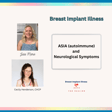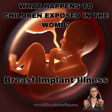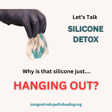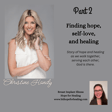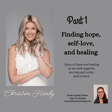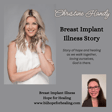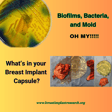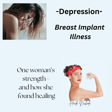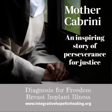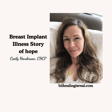Become a Creator today!Start creating today - Share your story with the world!
Start for free
00:00:00
00:00:01

Breast Implants ----Let's Talk TOXICOLOGY
www.biihopeforehealing.com/free-course
Learn about toxicological testing and how implants are recommended by the FDA to be tested by surgeons before implant surgery. WHY is NO one talking about this??? You don't want to miss this episode!!!
https://www.fda.gov/media/71081/download
Transcript
Introduction to Breast Implant Risks
00:00:01
Speaker
Welcome to Breast and Plant Illness Hope for Healing. This is Cecily Henderson, your host. Thank you for joining me today. In our podcast today, we will be focusing on the chemical composition of breast implants and how to use this information to convince your doctor or skeptic breast implants are making you sick.
00:00:27
Speaker
First off, I am not a doctor or a scientist, and I don't make any claims. I am a certified health coach practitioner, functional medicine provider, and breast implant educator. I've spent the last several years researching medical studies on breast implants and the impact they have on the body.
Chemical Composition and Cancer Risks
00:00:52
Speaker
So what are breast implants? Good question.
00:00:58
Speaker
The answer is chemicals, polymers, catalysts, volatile compounds, and heavy metals. The black box warning on the label states, breast implants may cause cancer of the immune system and a variety of systemic symptoms. So why are surgeons not talking about this warning? I do think more education needs to be out there for both patient and practitioner.
00:01:28
Speaker
So I created a free course to help people understand the toxicology, risks, and complications of breast implants. It has all the links in the course where you can find information to share with your doctor and loved ones.
Complications from Silicone Migration
00:01:45
Speaker
So why is it difficult for providers to offer care for women with breast implant illness? The answer is because silicone is a system invader.
00:01:57
Speaker
It can break down over time and migrate from the implant shell, through the capsule, along the blood vessels, and into any of your body's tissues. This makes it very difficult for practitioners to know exactly how to treat patients. Remember, I am not a scientist or a doctor, but the research is available for anyone to view.
00:02:24
Speaker
I have seen many practitioners step up and do their best to provide care to very sick BII patients. I know a lot of women who are trying to give advice and help other women that continue to have symptoms even after ex-planting. The problem is that some or many systems of the body might be affected by silicone and
00:02:51
Speaker
chemical migration.
FDA Testing and Safety Guidelines
00:02:53
Speaker
So we're going to talk about this a little bit, but first off, did you know that the FDA recommends that surgeons do testing on breast implants before surgery? Do you know if your surgeon did that for you?
00:03:12
Speaker
The reason the FDA recommends testing is because breast implants contain not only toxic polymers such as siloxanes, but also volatile compounds like D4. This comes from the manufacturing or sterilization process. These chemicals can leach out into the patient's body after surgery. Now I'm reading from the FDA website.
00:03:38
Speaker
In addition, the FDA also recommends that surgeons complete a safety assessment before surgery. They should include pharmacokinetic studies and nine different types of toxicological testing. Okay. You can look all of this information up in my course. So let's discuss these recommended tests that come directly from the FDA website.
Toxicity Testing and Immune Concerns
00:04:04
Speaker
Okay. Number one,
00:04:05
Speaker
The first test is called cytotoxicity testing. It is the term to measure how toxic a substance is to your cells. A cytotoxic compound can cause cell damage or death. This is very bad for your tissues.
00:04:24
Speaker
The second test is called acute systemic toxicity. So this involves taking a rabbit where they administer breast implant chemicals orally, dermally, or by inhalation methods. The animals that die during the study are autopsy to provide test results. And these results will show if breast implant chemicals will affect your whole system
00:04:53
Speaker
and cause toxicity. So wrap your head around that one. The next test they recommend is called immunotoxicity. The FDA recommends that surgeons assess the level of immunotoxicity of the shell and any leachable compounds. Let me say that again. Any leachable compounds.
00:05:18
Speaker
This test evaluates the potential for substance to alter the function of the immune system. Now I am quoting here off of the FDA website. The FDA also recommends a reproductive and teratogenicity test.
00:05:37
Speaker
This test measures the rates of conception, maturation, as well as the number of fetal deaths and malformations when exposed to breast implant chemicals. To me, this is one of the most concerning tests. Another recommended test is genotoxicity testing. This addresses the potential of leachable compounds from breast implants to cause cancer.
00:06:06
Speaker
the next test is called implantation testing.
Tissue Reactions and Cancer Studies
00:06:11
Speaker
So the FDA recommends surgeons place a sample of the shell and gel subcutaneously or submuscularly. So what this means is the surgeon will place a piece of shell and gel under your skin and in your muscle to see how you react. The FDA says the reason is because some implant chemicals may have immediate tissue reactions
00:06:36
Speaker
slow reactions, and long-term effects in your surrounding tissues. So the FDA is saying that your tissues may have reactions to breast implant shells and leachable chemicals. Think about that. The last test is carcinogenicity testing.
00:07:00
Speaker
This test determines the tumor potential of medical devices and materials such as breast implants. Remember, I am reading exactly what it recommends on the FDA website.
Addressing Skepticism and Support Resources
00:07:13
Speaker
I think you understand now the reason why implants are toxic. Even the FDA claims they can be and should have toxicological testing.
00:07:26
Speaker
If you are having difficulty convincing doctors or loved ones about the toxicity of breast implants, you can go direct them to my free course, which has all the information and more about the risks, complications, and toxicology of breast implants.
00:07:45
Speaker
The good news is that the human body is sustaining. I was extremely sick and paralyzed from an implant rupture and bacterial infection. Now I am healthy, walking and advocating for women with breast implant illness. I do not want you to feel alone in your journey. Please advocate for yourself. Don't give up. Talk about the research.
00:08:15
Speaker
I am here and other providers and women are here to help support you. Thank you for joining me today and always remember, there is hope for healing.
